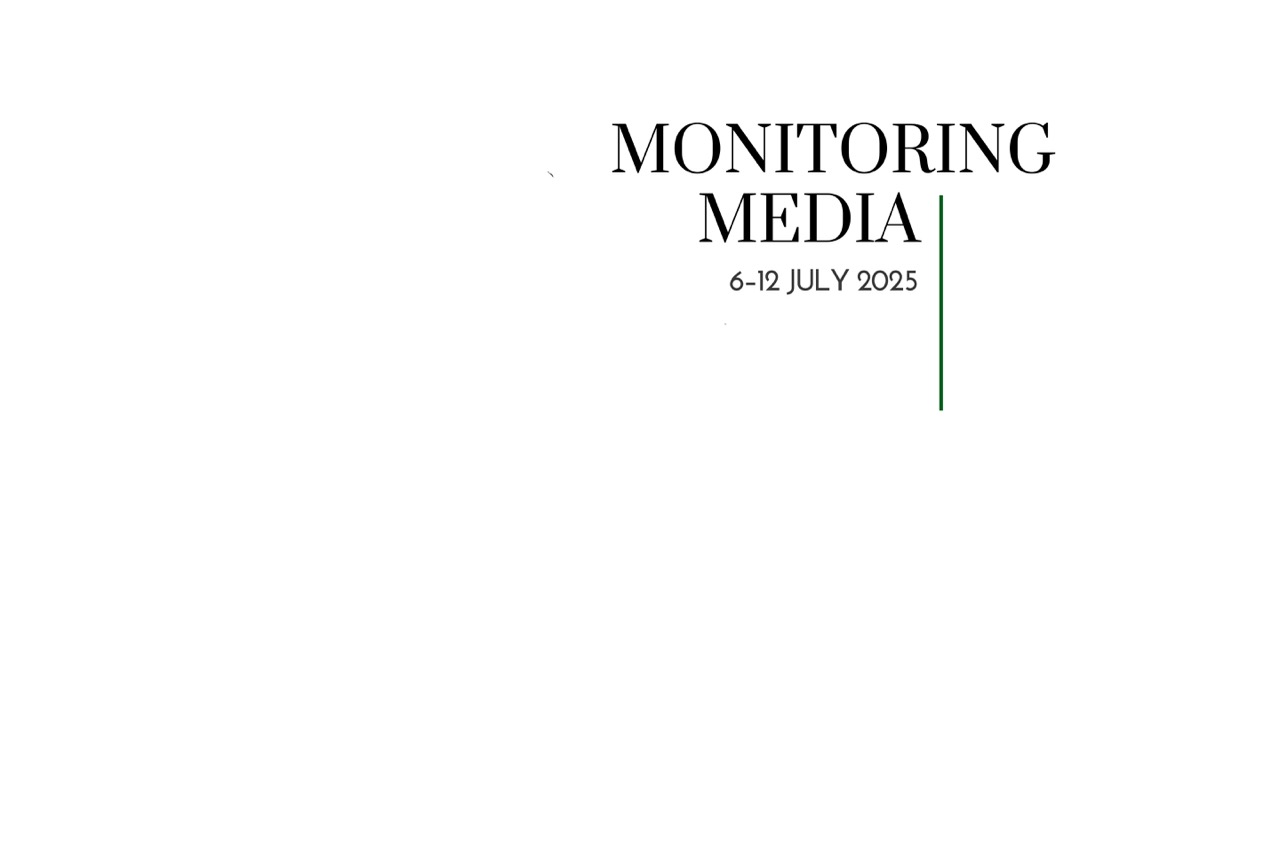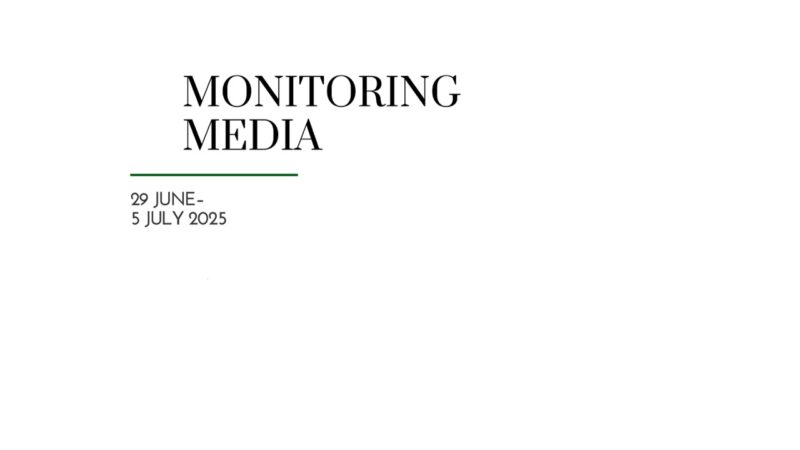Putinism is fascist

CIUS weekly report on North American media coverage of Ukrainian affairs, 6–12 July 2025
Five publications (The Economist, Foreign Affairs, Foreign Policy, The Wall Street Journal, and The Atlantic) were selected to prepare this report on how Ukraine has been portrayed in the North American press during the past week. The sample was compiled based on their impact on public opinion as well as on their professional reputation, popularity among the readership, and topical relevance. These publications represent centrist viewpoints on the political spectrum.
This MMS report covers only the most-read and relevant articles about Ukraine, as ranked by the respective North American publications themselves in the past week. Its scope covers promoted articles on home pages and articles from special sections on Ukraine, with the hashtag #Ukraine, from the paper editions of the publications, and about Ukraine from opinion columns and editorials.
Featured topics
- The world and Ukraine: political struggle in Ukraine intensifies; Georgia’s experience should serve as a lesson; Trump’s shifting arms policy leaves Kyiv in strategic limbo.
- Russia at war: Putinism is fascist; Russia may take advantage of the vacuum in Europe.
MMS summaries
Political struggle in Ukraine intensifies. Analysis by the Economist shows that against the backdrop of the sudden suspension of US financial aid to Ukraine, an active political struggle has unfolded. This thesis is confirmed by three key events that took place in June: (1) corruption charges against Ukraine’s Deputy Prime Minister Oleksiy Chernyshov, who was a candidate for the post of prime minister; (2) imminent personnel changes in the government, with the possible appointment of Yulia Svyrydenko as the new prime minister; (3) attempts to remove the head of the Main Directorate of Intelligence of the Ministry of Defence of Ukraine, Kirill Budanov. According to the Economist, one person is behind all these attempts: “Multiple sources identify the shadowy hand of Andriy Yermak, who runs the presidential office but in reality is an unelected chief minister in all but name, as instrumental in all three plays.” Rough palace politics are not a new phenomenon, especially for a state at war, “but the enormity of the country’s predicament—with its strategic situation deteriorating with every day—makes concentrated and dysfunctional power structures dangerous.”
Is Putinism fascist? Andreas Umland (National Interest) asks whether the modern Russian regime is fascist. Classically, the generalizing term fascism serves as a socio-political category, allows comparisons across time and space, and highlights the differences and similarities between historical fascism and modern autocratic regimes. The key feature that distinguishes fascists from other right-wing extremists is their propagandistic goal of political, social, cultural, and anthropological revival: “Fascists often refer to a supposed Golden Age in their nation’s distant past and use ideas and symbols from this mythologized prehistory. However, they do not want to preserve or restore a past era but rather to create a new kind of national community.” According to this approach, Umland reasons, the Kremlin regime is not fascist, because it seeks to revive the Russian Empire rather than create an entirely new Russian state and people. On the other hand, says the author, Russia’s policy in the occupied Ukrainian territories can be classified as quasi-fascist in a more direct sense: “The ruthless Russification campaign that the Russian state is carrying out in the annexed parts of Ukraine through targeted terror, forced re-education, and material incentives aims to achieve a profound sociocultural transformation of these areas.” Such colonizing and homogenizing policies are not necessarily considered fascist in comparative imperialism studies. Nevertheless, “instruments used by the Kremlin to implement its Ukraine policy and the desired outcomes are in some respects similar to those of the fascist revolutions attempted by Mussolini’s Italy and Hitler’s Germany.” According to Umland, “The Russification policy in Ukraine is thus sufficiently similar to classic fascist domestic and occupation policies so that Moscow’s transformative goals and actions regarding Russia’s Ukrainian ‘brothers’ could be classified as, at least, quasi-fascist.”
Russia may take advantage of the vacuum in Europe. Andrea Kendall-Taylorm, Jim Townsend, Kate Johnston (Foreign Affairs) argue that a rapid decline of the US presence in Europe could create a vacuum for Russia to exploit. This year’s NATO summit in the Hague was marked by a positive decision for Europe. However, the elation caused by the summit’s results may be short-lived if Washington decides to significantly and rapidly reduce the American contingent in Europe. The EU is taking significant steps and defence budgets are growing, but it will take time to ramp up production and realize the opportunities that the US currently has on the continent. Moscow will likely view the rapid withdrawal of US troops from Europe as a golden opportunity for itself: “Moscow has long sought to undermine NATO, seeing its demise as a critical step toward reasserting Russia’s position as a global power. Most immediately, the Kremlin would seize on any U.S. retreat to amplify Europeans’ anxiety that Washington is abandoning them. With Europe feeling vulnerable, Moscow would ratchet up its coercive tactics to intimidate European publics and pressure their governments to be more accommodating to Moscow.” According to the authors, “It is critical that any drawdown be closely coordinated with NATO military authorities and that allies agree in advance to cover lost capabilities. Otherwise, Russian President Vladimir Putin will be tempted to take advantage of a weakened alliance.”
Georgia’s experience should serve as a lesson. Eka Tkeshelashvili (Foreign Policy) argues that a ceasefire alone is unlikely to end Russia’s desire to dominate Ukraine. Therefore, Washington and its allies must be prepared to counter Moscow’s attempts to subjugate Kyiv by other means: “The day after [the ceasefire], Moscow will continue to threaten Ukraine’s sovereignty and meddle in its internal affairs, and the West will need to have a strategy for dealing with that.” If the US and Europe attempt to normalize relations with Russia without Ukraine’s rapid integration into Western institutions and the provision of real security guarantees, this could provoke Russia to further military intervention and piecemeal destruction of Ukrainian democracy. They risk repeating the mistake made with Georgia: “For Europe and the United States, Russia’s 2008 invasion of Georgia was a missed wake-up call. At the time, Western governments did not recognize that it was part of a larger Russian campaign to dismantle the post–Cold War order.” According to Tkeshelashvili, “Washington and its European allies would do well to study the example of Georgia to understand why a postwar plan for Ukraine is so vital.”
Trump finally shifts stance on Putin. The editorial board of the Wall Street Journal argues that President Trump’s decision to resume US weapons shipments to Ukraine marks a pragmatic shift toward strengthening American security interests, despite internal resistance within his administration. During his meeting with Israeli Prime Minister Benjamin Netanyahu, Trump declared: “We’re going to send some more weapons. We have to. They have to be able to defend themselves,” signaling a break from Pentagon “restrainers” who argued that depleted stockpiles made further aid unsustainable. The authors criticize officials like Elbridge Colby, who argue that the US should prioritize avoiding a potential Pacific conflict with China, as well as those who claim that “it is natural to feel sympathy for Ukraine’s plight, but our leaders must put aside emotion.” Instead, the editorial insists that arming Ukraine is a realist move to deter President Putin’s aggression and prevent Russia from achieving its war aims. The authors also call for Trump to escalate pressure on Moscow through stronger military aid and tougher sanctions. They stress that merely sending “defensive” weapons has failed, echoing Rebeccah Heinrichs’ point that “every weapon to Ukraine is defensive as the country defends against an invader.” To truly shift Putin’s cost-benefit calculation, the US should provide long-range weaponry, Patriot missiles, and artillery shells while signalling that continued Russian escalation could result in the permanent loss of $300 billion in frozen reserves. Beyond aiding Ukraine, Trump’s pivot also looks like an opportunity to reverse a weak 2026 domestic defence budget and rebuild weapons manufacturing capacity—especially when systems like Patriots fall short of what’s needed to defend America’s global interests.
Trump’s shifting arms policy leaves Kyiv in strategic limbo. Nancy A. Youssef (Atlantic) highlights the damaging unpredictability of US arms policy toward Ukraine under President Trump, which has left Kyiv unable to plan its defence against intensified Russian attacks. The author argues that Ukraine is “struggling because they don’t know what U.S. policy will look like,” noting that sudden halts and resumptions of weapons shipments force Ukraine to constantly revise its battlefield strategy. As one senior Ukrainian official put it, the halting flow of aid is like “a game of roulette,” making it difficult to defend vulnerable areas or to secure replacement parts when American support is paused. Military planners emphasize that the uncertainty itself—rather than the absence of any single shipment—is more damaging to Ukraine’s war effort, as it emboldens Russia to escalate its attacks, increasingly “hopeful that U.S. security assistance will at some point die on the vine,” and erodes prospects for diplomacy. Youssef also underscores how Trump’s transactional approach to foreign policy undermines US credibility and Ukraine’s ability to defend itself. While Trump briefly vowed to send weapons, saying, “We have to; they have to be able to defend themselves,” the administration has not provided clarity on future deliveries, leaving Kyiv dependent on dwindling stockpiles approved under Biden. Defence Secretary Pete Hegseth has repeatedly suspended shipments without consulting the White House, further deepening the confusion. Ukraine is now forced to ramp up its own arms production and seek European support, but critical systems like Patriot missiles remain under the exclusive purview of the US. Ukraine’s President Zelensky can only hope that the latest “political statements and decisions” from Washington will translate into timely, consistent action to protect Ukrainian lives and positions.





